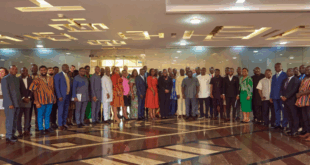Libya’s rival leaders have left Moscow without reaching agreement on a ceasefire deal proposed by Russia and Turkey in an effort to bring an end to the country’s long-running civil war.
Fayez Sarraj, the head of Libya’s UN-recognised government in Tripoli, and General Khalifa Haftar – the power behind the eastern government – came to Moscow on Monday to discuss a truce hosted by Russian and Turkish officials.
The talks lasted about seven hours, but Sarraj and Haftar didn’t meet directly.
After the meetings, Russian Foreign Minister Sergey Lavrov and his Turkish counterpart, Mevlut Cavusoglu, announced that Sarraj signed the draft document spelling out the details of the proposed ceasefire deal, while Haftar requested more time to consider it.
On Tuesday morning, Russian Foreign Ministry said that Haftar left Moscow without signing the deal. Russian news agencies reported Tuesday that Sarraj had also left.
Lavrov said that efforts to broker a peace deal will continue. “We all work in the same direction and urge all the sides (of the conflict) in Libya to negotiate instead of trying to sort things out violently,” the minister said Tuesday.
Berlin peace conference
Tripoli-based official Khaled al-Mashri told Libya Al-Ahrar TV that Haftar asked for four days to consider various sticking points in the ceasefire deal. He said he expects invitations to a peace conference in Berlin to follow later this week.
The negotiations followed a truce proposed by Russia and Turkey that began Sunday, the first break in fighting in months. There were immediate reports of violations by both sides, however, raising concerns it might not hold.
Libya plunged into turmoil after the 2011 civil war that ousted and killed longtime dictator Moammar Gadhafi. The conflict had been on the brink of a major escalation. Various foreign players back Libya’s rival governments, and they have recently been stepping up their involvement in the oil-rich nation’s conflict.
Russian-Turkish mediation
Turkey and Russia back the opposing governments in Libya. Their negotiations follow deals struck by the two nations to coordinate their action also in Syria, where Moscow has shored up President Bashar Assad’s government and Ankara has backed his foes.
Ahead of the Moscow meeting, expert Barah Mikail, director of Stractegia Consulting and Associate Professor at Saint Louis University in Madrid noted that the talks highlighted the influence of Russia and Turkey in the Libya conflict.
“Russia and Turkey have leverage on Khalifa Haftar and Fayez Sarraj respectively,” Mikail said, noting that it is at these two countries’ request that Haftar and Sarraj were headed to Moscow.
But according to the expert, the chances of success of this mediation were slim. And indeed proved to be so on this occasion.
“Each of the protagonists is sticking to its guns and the conditions for peace and a negotiated solution are far from being met. Thus, if there is a ceasefire, I very much doubt that it can hold in the long term on the ground,” the expert told Euronews.
“We shall, therefore, be extremely cautious about the possible chances of success of this Turkish-Russian mediation in the long term,” Mikail said.
Source: euronews
 Home Of Ghana News Ghana News, Entertainment And More
Home Of Ghana News Ghana News, Entertainment And More





